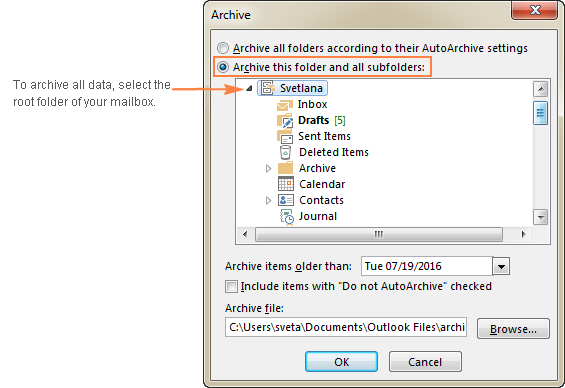
- #Outlook 2016 archive file size does not change how to
- #Outlook 2016 archive file size does not change upgrade
- #Outlook 2016 archive file size does not change Offline
There you’ll see the slider, which is shown in the screenshot below. In Outlook, go to File -> Account Settings, then highlight the account and click the Change button. The OST slider allows you to control how much of your mailbox data is cached to your computer’s hard drive. Before this feature was developed, caching a mailbox in Outlook was an all or nothing proposition. With Outlook 2013 they introduced the cached mode slider, also sometimes referred to as the OST slider. With the large mailbox quotas for Exchange Online mailboxes, Microsoft thought it prudent to implement a method for partial caching of mailboxes.
#Outlook 2016 archive file size does not change how to
How to Manage OST File Sizes Using the Outlook Cached Mode Slider Rebuilding the OST file for a large mailbox can take a long time, and the user has a degraded experience while the rebuild is occurring.īut there are solutions so that you can avoid those issues.

Recovering from OST file corruption means deleting the file, and then allowing Outlook to download the mailbox contents to a new OST file. Large OST files are also prone to corruption.

New mail won’t appear in Outlook, and they will be unable to move existing mail between folders.

In fact, if the Outlook cache grows to the maximum file size, the user will begin to see problems. Can an OST file hold all the data in a 100GB mailbox? No, it can’t. With the huge size of mailboxes possible in Exchange Online and Exchange on-premises, the size limit of OST files is a problem. Today, Outlook will use the Unicode file format by default. The older ANSI format has an OST file size limit of only 2GB. The limits above apply to OST files in Unicode format, also known as “Large format”.
#Outlook 2016 archive file size does not change upgrade
Outlook 2010 is also out of mainstream support, so hopefully if you are still running Outlook 2010 you are planning an upgrade in the near future. Hopefully you’re not running Outlook 2007 or 2003, both of which are unsupported today.
#Outlook 2016 archive file size does not change Offline
OST files are Outlook offline data files. Outlook’s local cache of mailbox data is stored in a file format known as an OST file.

When they reconnect to a network, their emails are sent, and any new emails are downloaded for them to read. Users can read and compose emails without network connectivity, such as when traveling. Second, Outlook cached mode allows users to work with mailbox data while offline. They use Outlook over slow networks such as home internet connections and public Wi-Fi. Users connect to their mailbox over longer distances. These days, Exchange mailboxes are hosted on servers on centralized datacenters, or in the cloud in Office 365. In the old days, when Outlook was primarily used to connect to Exchange servers that were close to the end user, on-line mode was good enough. Outlook performance in “on-line mode” is not all that great. When you connect Outlook to an Exchange account, Outlook downloads a copy of your mailbox content to a local cache.


 0 kommentar(er)
0 kommentar(er)
